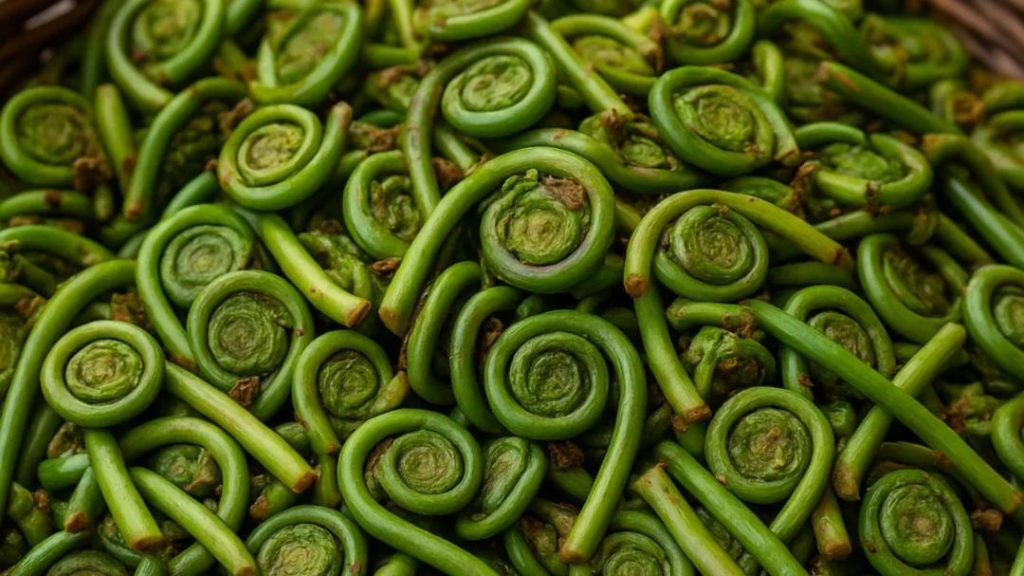
Lingad, a Monsoon Fern, Boosts Immunity and Bone Health
The monsoon season in the Himalayas is a time of great abundance and beauty. The lush green forests come alive with the sound of rushing water and the scent of wet earth. It is during this time that the lingad, a type of fiddlehead fern, is harvested. Known as Lengdu, Dhekia, or Nigro locally, this wild fern has been a staple in many Indian households for centuries. Not only is it a delicacy, but it is also packed with nutrients that boost immunity and support bone health.
What is Lingad?
Lingad is the young, coiled shoot of the Diplazium esculentum, a type of fern that grows in the Himalayas. The fern is harvested during the monsoon season, when the shoots are still tender and curled. This is the best time to collect the fern, as it is at its most flavorful and nutritious. Once the shoots mature and become fibrous, they are no longer suitable for cooking.
Traditional Use
Lingad has been a part of Indian cuisine for generations, particularly in the North Eastern states of India. It is often used in traditional dishes such as soups, stews, and stir-fries. The fern is rich in flavor and has a unique texture that is both crunchy and tender. In some parts of India, lingad is also used as a medicine to treat various ailments, such as fever, cough, and respiratory problems.
Nutritional Benefits
Lingad is a nutrient-dense food that is rich in vitamins, minerals, and antioxidants. It is an excellent source of:
- Fiber: Lingad is high in dietary fiber, which can help to regulate bowel movements and prevent constipation.
- Vitamin K: The fern is a rich source of vitamin K, which is essential for blood clotting and bone health.
- Calcium: Lingad is a good source of calcium, which is necessary for strong bones and teeth.
- Iron: The fern is rich in iron, which is essential for healthy red blood cells.
- Antioxidants: Lingad contains a range of antioxidants, including polyphenols and flavonoids, which can help to protect the body against free radicals and oxidative stress.
Health Benefits
The nutritional benefits of lingad make it an excellent food for boosting immunity and supporting bone health. Some of the specific health benefits of lingad include:
- Boosts Immunity: The antioxidants and vitamins in lingad can help to boost the immune system, reducing the risk of illness and infection.
- Supports Bone Health: The calcium and vitamin K in lingad are essential for strong bones and teeth. Regular consumption of lingad can help to reduce the risk of osteoporosis and fractures.
- Anti-Inflammatory: The antioxidants in lingad have anti-inflammatory properties, which can help to reduce inflammation and improve overall health.
- Anti-Cancer Properties: The polyphenols and flavonoids in lingad have been shown to have anti-cancer properties, reducing the risk of certain types of cancer.
How to Cook Lingad
Lingad can be cooked in a variety of ways, including steaming, sautéing, and stir-frying. Here are a few simple recipes to get you started:
- Steamed Lingad: Simply wash the lingad and steam it in a steamer basket for 5-7 minutes. Serve with a squeeze of lemon juice and a sprinkle of salt.
- Sautéed Lingad: Wash the lingad and sauté it in a little oil with some garlic and ginger. Serve with rice or noodles.
- Stir-Fried Lingad: Wash the lingad and stir-fry it with some vegetables, such as bell peppers and onions. Serve with rice or noodles.
Conclusion
Lingad, the monsoon fern, is a nutrient-dense food that is rich in vitamins, minerals, and antioxidants. It has been a part of Indian cuisine for generations and is used to boost immunity and support bone health. Whether you are looking for a healthy and flavorful addition to your meals or a natural remedy for various ailments, lingad is definitely worth trying. So next time you are in the Himalayas during the monsoon season, be sure to try some lingad and experience its unique flavor and benefits for yourself.






